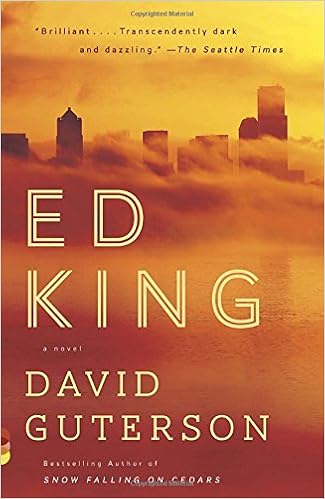“Freud bullied his way into David Guterson’s adaptation of
the Oedipus myth, Ed King
(Bloomsbury), which includes a lengthy description of mother–son bonding that
Sophocles had seen fit to leave offstage:
“‘So she took him by
the wrist and moved the base of his hand into her pubic hair until his middle
fingertip settled on the no-man’s-land between her ‘front parlor’ and ‘back
door’ (those were the quaint, prudish terms of her girlhood), she got him on
the node between neighboring needs (both of which had been explored by johns
who almost never tarried).’
“It’s hard to work out what is more excruciating, Guterson’s
jarring language – we’re later treated to ‘membrum virile’, ‘skin flute’ and
‘family jewels’ – or his naive belief that a sprinkling of inverted commas is
sufficient to ironise his euphemisms” (https://literaryreview.co.uk/bad-sex-report2011).
Schatje’s Review of Ed King
2 Stars
The book is a computer-age retelling of Sophocles' play Oedipus Rex which Aristotle considered
the perfect tragedy. Unfortunately, Guterson's reworking of the Greek tale of
patricide and incest is not quite so perfect; in fact, it won the 2011 Literary
Review Bad Sex in Fiction Award for the worst description of a sex scene in a
novel.
The setting is Oregon, beginning in the 1960s. Walter
Cousins has an affair with his underage British au pair, Diane Burroughs, who
becomes pregnant and gives birth to a son whom she abandons. The child is
adopted by Dan and Alice King who name him Edward Aaron (his middle name a
salute to the King of Rock and Roll). The rest of the novel covers Diane and
Ed's lives. Diane constantly remakes herself; at different times she is an
escort, wealthy wife, much-less-wealthy divorcee, cocaine dealer and life
coach. For Ed, everything comes easily, since he has both looks and
intelligence; with his attitude of superiority and entitlement, his encounter
with Walter on an isolated road has predictable consequences. Ed and Diane meet
and marry and become the king and queen of an internet domain. When Ed
discovers that he was adopted and learns the identity of his parents, the
result is a supersonic version of the myth of Icarus.
One problem with the novel is that it is long on exposition
and short on dialogue. There is a definite lack of showing and much telling in
the vein that this happened and then this happened and then this happened.
Another weakness is that all the characters are superficial
and amoral. No one is likable, and their unrelenting superficiality and
amorality begin to grate. Ed (a composite of modern America's gods of
technology - Steve Jobs, Bill Gates, and Mark Zuckerberg) is no tragic hero: he
is not a good man with one major character flaw.
The soullessness of the characters is intentional. It
conveys a message about modern culture since the book is somewhat a social
satire with commentary on such topics as cosmetic surgery, the violence of
gaming, global warming, and the ruthlessness of tech-titans.
The strongest appeal of the novel is seeing how the mythical
elements have been modernized. Anyone who has read Sophocles will appreciate
how some of the original tale has been incorporated: Ed, like Oedipus, is born
to a man of dubious morals, is abandoned, and is passed on to a
"kingly" family. Both experience foot problems. Ed's attempt to
create artificial intelligence can be interpreted as his attempt to crack the
riddle of the Sphinx. Ed names his search engine Pythia, the name of the Oracle
of Delphi. The excerpts of internet chatter at the beginning and end serve as a
type of Greek chorus. Unfortunately, sometimes the parallels are made too
obvious. Does Ed really have to be told that he suffers from "an
overwhelming and dangerous hubris"?
It can be hoped that Guterson's book will entice people to
read or re-read the original drama; its lessons about ambition and hubris need
not be modernized to be seen as relevant today as they were in the time of
Sophocles and Aristotle.

No comments:
Post a Comment